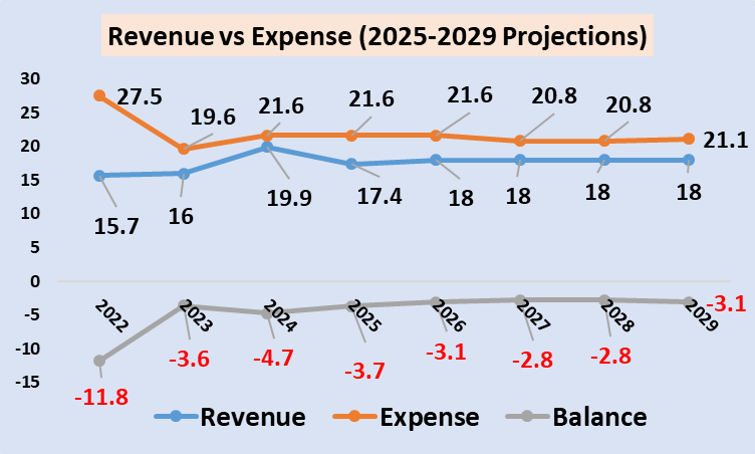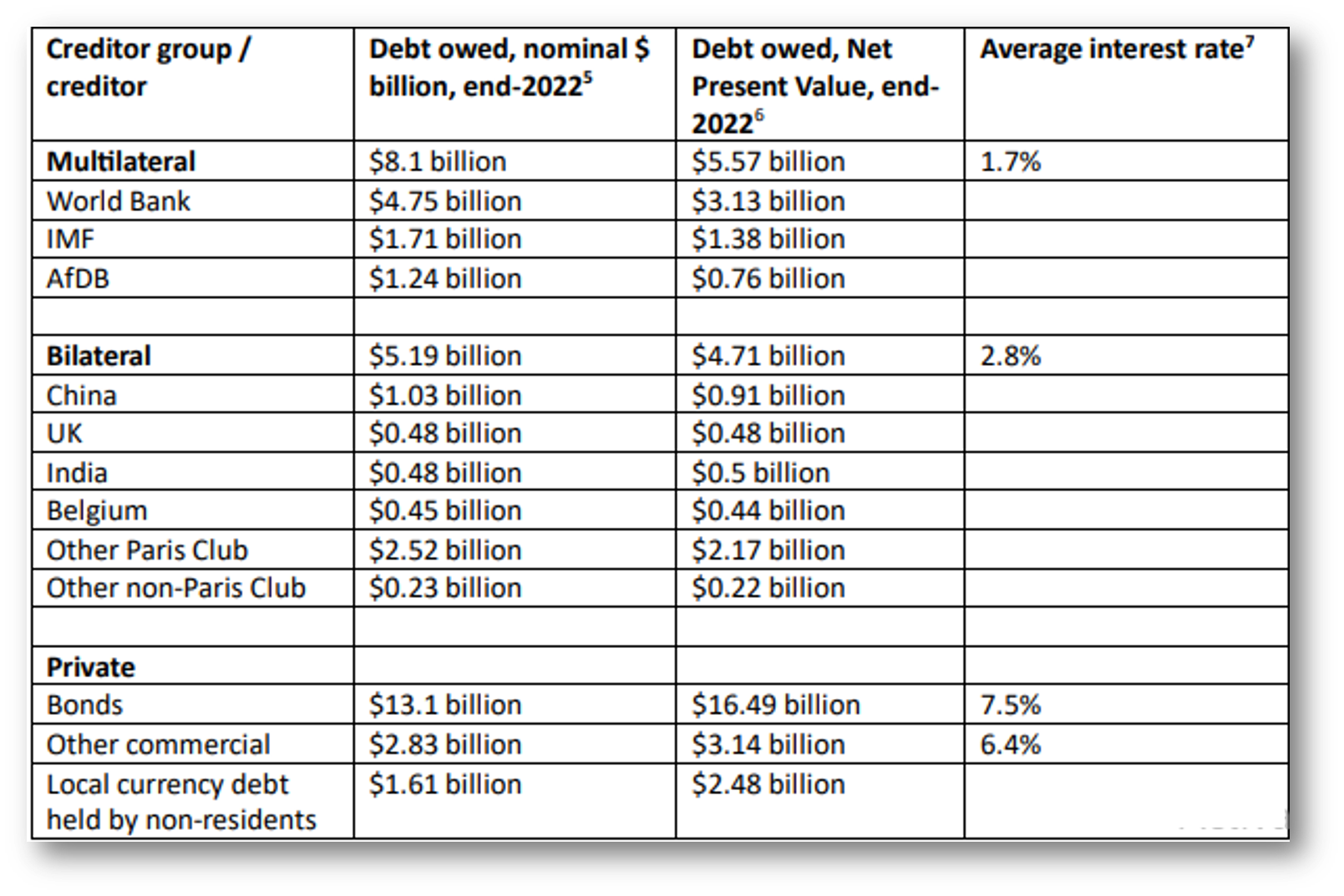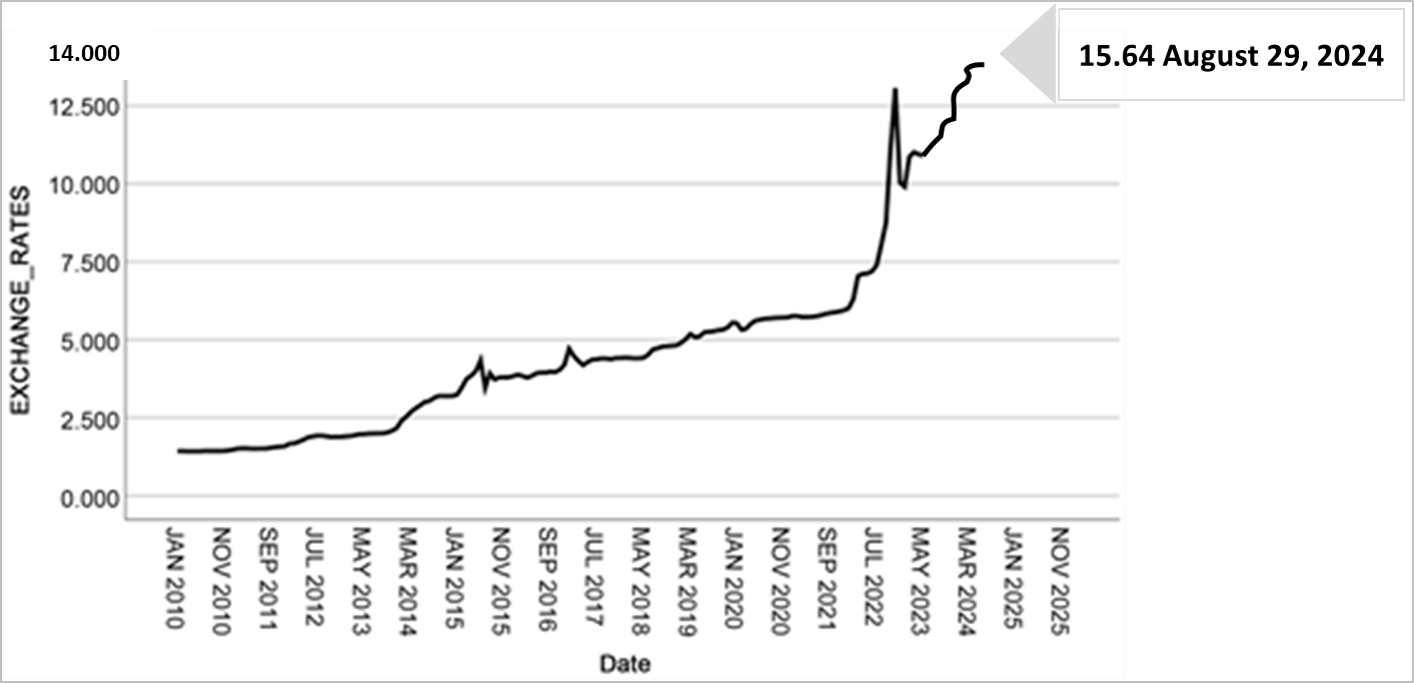Key economic indicators to watch in year two and three of the ECF
Anthony Poku, Washington DC, USA
June 18, 2024
T he Executive Board of the International Monetary Fund (IMF) approved a 36-month Extended Credit Facility (ECF) for Ghana on May 17th, 2023. This facility provides access to US$3 billion to implement economic reforms. Ghana and the IMF anchored the program to the country’s Post COVID-19 Program for Economic Growth (PC-PEG). The ECF aims to restore macroeconomic stability and debt sustainability. Ghanaian authorities expect the program to lay the foundation for inclusive growth and for a reinforcement of protection for the poor and vulnerable.
During the first review of the ECF, the IMF concluded that Ghana’s performance under the program has been strong. The Fund noted that Ghana met quantitative performance criteria, including indicative targets and structural benchmarks. After the signing of the ECF in May 2023, the IMF immediately disbursed US$600 million as the first tranche. Then Ghana's secured the second tranche of IMF US$600m for disbursement in January 2024. In June 2024,the Executive Board of the International Monetary Fund (IMF) approved Ghana's US$360 million third tranche after a second review.
After the second review in June 2024, the IMF conclucded that growth is ‟proving more resilient than initially expected, inflation declining at a faster pace and the fiscal and external positions are also improving”. But the Fund also cautioned against downside risks even though the ‟ medium-term outlook remains favorable”1. New Economy Ghana looks at five indicators that are crucial to the outcome of the reforms. These include growth, deficits, debt, exchange rate, and inflation.
Growth
Growth showed resilience, reaching 2.9 percent in 2023. The services, agriculture sectors, ICT, and transport contributed to this performance. Tourism and hospitality also contributed by sustaining post-COVID-19 recovery with growth of 6 percent. But the utility sector (electricity, water, and recycling) contracted, recording a negative 20 percent.
Sectors and subsectors that stagnated or remained volatile during the year are manufacturing, extractives (mining segment) and real estate (construction and infrastructure projects)2. The World Bank expects growth to remain at 2.8 percent in 20243 while the IMF forecasts 3.1 percent. This is because growth in non-extractives growth continues to stagnate. Agriculture suffered from volatile imported input prices and remained vulnerable to the vagaries of climate change. Ghana is counting on the rebound of the extractive sector to grow trade and increase export earnings in 20254.

Source: IMF (2024)
Trade and fiscal deficits
The government’s expenditure continues to exceed revenue, resulting in consistent fiscal deficits. Import dependence exacerbates fiscal deficit and exchange rate depreciation. Together they create an unfavorable balance of payments position for the country. Ghana’s external trade has the resources to reduce deficit. But trade data exhibit a geographical concentration. Exports to and import from Europe, Asia, the Middle East, and the Americas dominate external trade. Negative changes in the economies of these trading countries have a direct impact on the economy of Ghana.
The Minister of Finance, Ken Ofori-Atta, said that outstanding payments (payables) and additional expenses caused the increase in fiscal deficit and debt service in 2022 and 20235. However, for the fiscal year 2024, the Minister forecasts a moderation of fiscal deficit. The midterm targets of the Ghana Ministry of Finance are 4.6 percent in 2024 and 2.4 percent of GDP by 2027.
Ghanaian authorities expect continued improvement in 2024 and 2025 following a trend that started in 20226.

Source: IMF (2024)
Debt sustainability
Ghana signed a debt restructuring agreement with Eurobond holders on June 24, 2024. Under this agreement, bondholders would forego approximately US$4.7 billion of their claims and provide cash flow relief of approximately US$4.4 billion during the IMF program period. The government and the creditors agree that these concessions are necessary given the constraints faced by the Republic of Ghana. They also believe this decision is essential to achieve the debt relief required to restore debt sustainability.
Before the Eurobond, Ghana had sealed a similar agreement with its official creditors under the G20 Common Framework. Ghana owes Ghana owes US$5.19 billion of bilateral debt. Following the successful completion of the domestic debt exchange programme (DDEP) in 2023, which covered US$20.4 billion, the IMF says that the agreement with Eurobond holders constitutes a significant positive step towards restoring Ghana’s long-term debt sustainability.
The ultimate goal for Ghana is to regain access to international markets.
Debt portfolio in 2022, before restructuring

Source: debtjustice.org.uk 7
Cedi volatility
The Cedi has fallen against the USD after it staged a modest recovery during year one of the ECF. Before the debt crisis, capital outflow, expansionary monetary policy, and inflation put substantial pressures on the exchange rate. The Cedi stabilized against the US dollar from early 2023 with an average annual depreciation rate of 25.7 percent. ECF’s inflows contributed to this improvement. But two domestic programs (the domestic gold purchase and the gold for oil program) also reduced FX demand.
Against the continued Cedi volatility, the Bank of Ghana (BoG) responds by tightening its monetary policy. It stopped monetary financing and asked for a ban on parallel and non-official exchange rates markets. But external factors such as the strong U.S. economy, a high U.S. interest rate policy and a flight to quality continue to exert pressure on the Cedi. Nevertheless, the Bank remains optimistic, while admitting that ‟in the near term, the US dollar’s strength may continue to pose some risk to the stability of the Cedi”8.

Inflation
Inflation has been a stubborn economic indicator for Ghanaian authorities over the past decade. According to Professor economics : F. Kwame Agyire-Tettey, PhD (University of Ghana)13, the root causes of inflation are:
- ▪ Money supply: This implies an expansion of the monetary base in order to accommodate huge budget deficits over the years.
- ▪ Declining food production: Ghana's food production is unable to meet rising demand. Climate change, archaic farming system and rural exodus continue to cause a decline in food output. Together these factors exert upward pressures on food prices and food inflation in Ghana.
- ▪ Cost of borrowing: In recent years, Ghana has borrowed heavily on the international and domestic markets, at high interest cost. Debt service deplete public finances and lead to low investments in productives sectors and critical infrastructure.
- ▪ Exchange rate depreciation: domestic and external factors are putting the Cedi under severe stress. This cntinuous and persistent depreciation of the domestic currency also lead to higher domestic prices, especially for imported products and services.
- ▪ Imported inflation: Dependence import distorts the productive system by making local production uncompetitive. Also Ghana exports raw commodities with no value addition, while at the same time importing refined and processed products (e.g. petroleum products). Increasing world market prices of crude oil and derivated processed products exerts cost pressures on domestic production.
In May 2024, the BoG reported average CPI inflation was 25 percent. Inflation has fallen by over half after reaching 54.1 percent in December 2022. Food and non-food inflation figures have also fallen. In March 2024, food inflation was 29.6 percent (from 61 percent in January 2023). Non-food inflation has also followed the same downward path. It has fallen to 22.6 percent (from 49.9 percent in December 2022)10. Since November 2023, individual products or services that contribute over 50 percent to the CPI basket with inflation have disappeared11 from CPI basket of good and services of the Ghana Statistical Service.

Source: IMF (2024)
The BoG is upbeat about inflation. In January 2024, the Bank reported that internal measures of core inflation have fallen. The expectation is that further disbursements from the IMF-ECF, cash from cocoa syndicated loan, and funding from the World Bank will further decelerate inflation12. During Year 2 of the ECF, the IMF expects the Bank of Ghana (BoG) to ‟continue tightening monetary policy” under the Extended Credit Facility.
Related Articles
BIBLIOGRAPHY
1❩ IMF (2024): IMF Executive Board Completes the Second Review under the Extended Credit Facility Arrangement with Ghana - June 28, 2024 - https://www.imf.org/en/News/Articles/2024/06/28/pr24241-ghana-imf-exec-board-completes-2nd-rev-ecf-arr#:~:text=The%20IMF%20Executive%20Board%20today,program%20has%20been%20generally%20strong.
2❩ Ghana Statistical Service (2024): Newsletter Quarterly GDP 2023 Q4 March 2024 Edition.pdf https://statsghana.gov.gh/gssmain/fileUpload/National%20Accounts/Newsletter_Quarterly_GDP_2023_Q4%20March_2024%20Edition.pdf
3❩World Bank (2024): The World Bank in Ghana - https://www.worldbank.org/en/country/ghana/overview
4❩ World Bank Ibid
5❩ https://mofep.gov.gh/press-release/2022-04-26/ghanas-overall-2021-real-gdp-growth-of-5.4-percent-outperforms-the-4.4-percent-growth-target
6❩ AfDB (2024): Africa’s Macroeconomic Performance and Outlook - January 2024 https://www.afdb.org/en/documents/africas-macroeconomic-performance-and-outlook-january-2024
7❩ Debt Justice (2024) Analysis of Ghana’s debt restructuring negotiations: Integrated Social Development Centre, Ghana (ISODEC) and Debt Justice UK - May 2024 - https://debtjustice.org.uk/wp-content/uploads/2024/05/Ghana-restructuring-analysis_05.24.pdf
8❩ Bank of Ghana (2023): Monetary policy report, November 2023.
9❩ F Ayiah-Mensah (2023): Trend Analysis of Exchange Rate of the Ghana Cedi against the US Dollar Using Time Series - https://www.scirp.org/journal/paperinformation?paperid=128265#:~:text=Exchange%20rate%20volatility%20or%20its,cost%20of%20production%20in%20Ghana.
10❩ Ghana Statistical Service (2024): Consumer Price Index (CPI) – March 2024 - https://www.statsghana.gov.gh/gssmain/fileUpload/Price%20Indices/Bulletin_%20CPI%20March%202024.pdf
11❩ Ghana Statistical Service (2023): Consumer Price Index and inflation – November 2023 https://statsghana.gov.gh/gssmain/storage/img/marqueeupdater/CPI%20November_2023.pdf
12❩ Bank of Ghana (2024): Monetary policy report - January 2024 - https://www.bog.gov.gh/wp-content/uploads/2024/01/Monetary-Policy-Report-January-2024.pdf
13❩ https://godsonug.wordpress.com/wp-content/uploads/2017/02/session-4-inflation-in-ghana-causes-and-remedies.pdf
